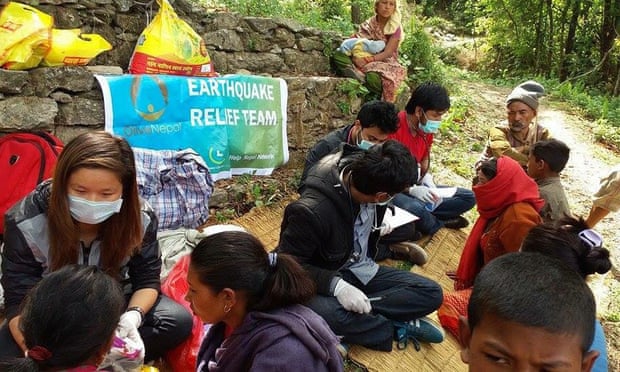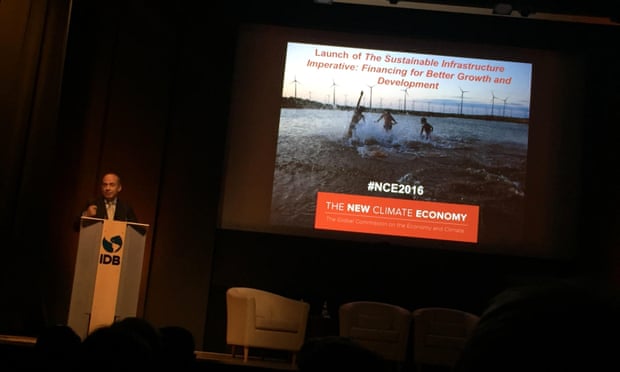Finance for deep-rooted prosperity is coming
Posted on 17 October 2016 by Guest Author
Joseph Robertson is Global Strategy Director for the nonpartisan nonprofit organization Citizens’ Climate Lobby.
“Macrocritical resilience” may be the most mystifying two-word phrase you need to know. Though you may never have heard these two words before, what they describe affects everything you live and strive for. Wonky as it sounds, it is a common sense idea: what generates value is more valuable than what we count in dollars. And yet, it is only in the last few years that we are truly beginning to understand that macrocritical indicators—elements of human experience that shape the health and viability of the overall economy—really do describe how and where value and capability come into being.
On Christmas Eve, 2013, the small island nation of St. Vincent and the Grenadines experienced the most intense rainfall in its history. 15 percent of gross domestic product was wiped out in just a few hours. In 2004, Hurricane Ivan caused $900 million worth of damage in Grenada—more than twice the nation’s GDP. One of the executive directors of the International Monetary Fund noted that when so much value can be lost so suddenly, “you no longer know what the value of a dollar is.”

A team of citizen volunteers provided needed health and recovery support to villages affected by the 2015 earthquake that ravaged Nepal. Climate resilience is partly about ensuring glacial melt and landslides are less of a threat to human populations. Photograph: Nepal chapter of Citizens' Climate Lobby.
Climate disruption is generating ever more destructive extreme weather events, putting countries on every continent at risk of macrocritical value loss—a disruption of economic progress that can take generations to come back from. The impact is “macrocritical”, because it affects the overall macroeconomy in critical ways that have long-running repercussions.
Resilience is the ability to “bounce back from a shock”. A tree bends so it will not break in a heavy wind. Systems need to be able to get back in shape after being hit with a major disruption.

Former Mexican President Felipe Calderón addresses launch of the New Climate Economy’s 2016 report on ‘The Sustainable Infrastructure Imperative’, on Thursday, October 6, in Washington, DC. The report is online at: http://newclimateeconomy.report/2016 Photograph: Joseph Robertson
In her address to the Chatham House Climate Change Conference, on October 10, Patricia Espinosa, Executive Secretary of the UN Climate Change Secretariat, said “Climate considerations must be mainstreamed into our global financial architecture.” Leaders in business and finance are beginning to see this as well. A sustainable portfolio is not just one that does good for others; it is one that is designed to thrive in a more competitive future.
This is also the view the IMF has taken, as it comes to grips with the many ways in which macrocritical drivers of value affect national budget outlooks. It is known, for instance, that between two countries that have similar resources, similar populations and similar national budgets, if all other things are equal, the one which refuses to educate young girls is far more likely to descend into sectarian conflict; its budget outlook it tainted by the macrocritical impact of under-educating girls and systematically excluding and mistreating women.
We are entering a new age in the life of Earth systems, and in the evolution of human civilization, but also in the way we conceive of finance—its purpose, its vulnerabilities, and its power to generate good outcomes. As we see more and more clearly that universal education, gender equality, food and water security, and climate resilience, are macrocritical drivers on which all other value ultimately depends, major financial institutions, both in the public and private sector, are learning how to measure their performance against macrocritical indicators.

Dr. Katharine Hayhoe discusses the role of Citizens’ Climate Lobby citizen volunteers in building political will for carbon pricing that returns all revenues to households, durign the South by South Lawn featured climate event with Pres. Barack Obama and Leonardo DiCaprio. Photograph: Joseph Robertson































 Arguments
Arguments






























This is the most positive story I have seen all year, and ever on this Sk S. These are solution oriented considerations. Although I am a UC MBA, I had not given sufficient weight to macroeconomic measures, even though this is really what has made Wind and PV advance so well. The generality that this is what will advance societies, rich and poor, is understated. Beyond knowledge and freedom to innovate, the biggest driver of economic progress is energy, which has meant CO2. By planning to reach beyond CO2 for energy as we advance all societies, a truly wonderful era is arriving. We can do it if we want to.
Thanks for the positive news.